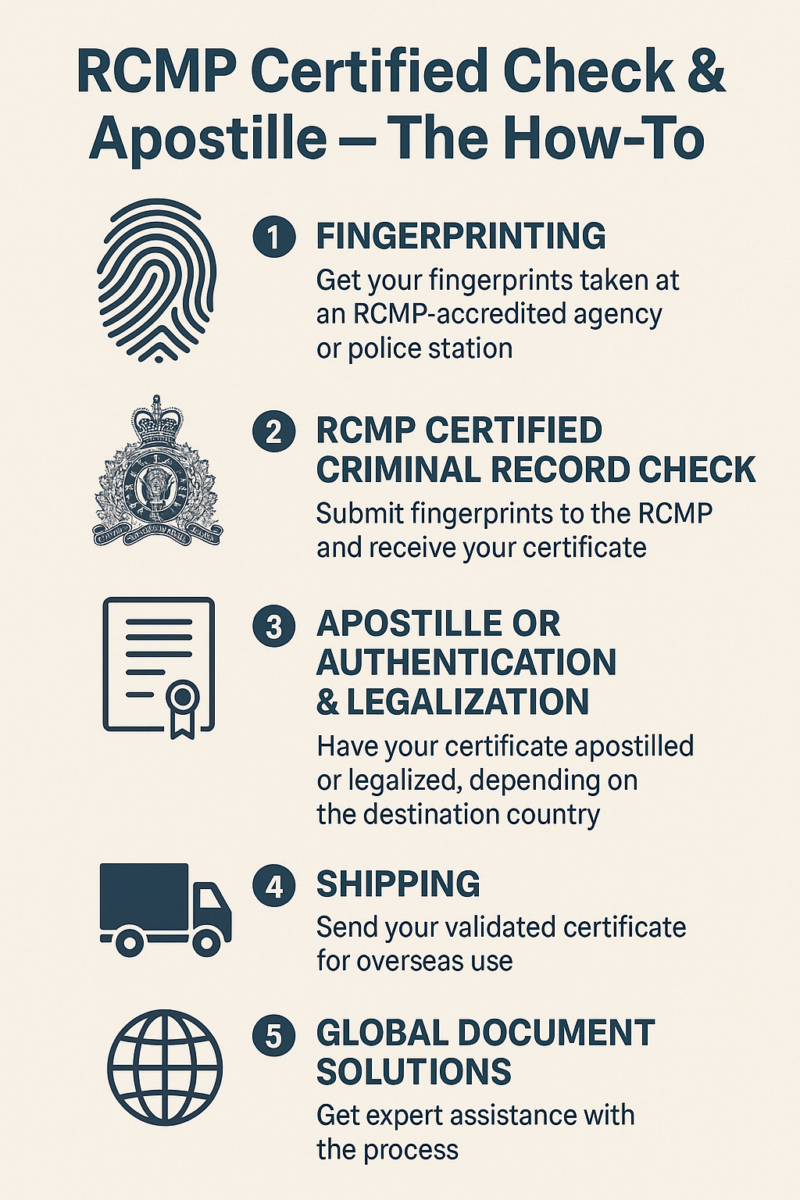RCMP Certified Police Check & Apostille – The How-To
Whether you're applying for a visa, work permit, residency, or even dual citizenship, many foreign governments require proof that you do not have a criminal record in Canada. The most widely accepted document for this purpose is an RCMP Certified Criminal Record Check, often referred to as a Police Clearance Certificate (PCC). However, to be recognized internationally, especially since Canada joined the Hague Apostille Convention in 2024, this document must also be apostilled or authenticated and legalized, depending on the destination country.
In this guide, we’ll walk you through the entire process—from fingerprinting to certification—and explain how using a professional firm like Global Document Solutions can save you time, stress, and costly delays.
Step 1: Understanding the RCMP Certified Criminal Record Check
A Certified Criminal Record Check is issued by the Royal Canadian Mounted Police (RCMP) based on your fingerprints. It provides the most accurate and internationally trusted confirmation of whether or not you have a criminal record in Canada.
Why Fingerprints Are Required
Unlike name-based checks, fingerprint-based checks eliminate the risk of mistaken identity. They are often required for:
-
Immigration and residency applications
-
Work or study permits abroad
-
Foreign adoptions
-
Visa applications (e.g., U.S., Spain, UAE, Brazil)
-
Citizenship through ancestry programs (e.g., Italy, Poland)
Step 2: Getting Your Fingerprints Taken
To apply for an RCMP Certified Record Check, your fingerprints must be submitted digitally or manually to the RCMP’s National Repository of Criminal Records.
Get RCMP accredited finger printing services with our trusted partners in key Canadian cities:
- 📍 Toronto – National Pardon Centre
- 📍 Mississauga – National Pardon Centre
- 📍 North York – National Pardon Centre
- 📍 Montréal – National Pardon Centre
- 📍 Vancouver – Pacific Fingerprint Services Inc.
- 📍 Surrey – Pacific Fingerprint Services Inc.
- 📍 Victoria – Pacific Fingerprint Services Inc.
Other Places to Get Fingerprinted:
-
RCMP-accredited fingerprinting agencies across Canada
-
Local police stations (if they provide the service)
-
International applicants can often be fingerprinted at:
-
Local police stations abroad
-
Canadian embassies and consulates
-
Notary public offices (accepted in some jurisdictions)
-
What You’ll Need:
-
2 pieces of government-issued ID (one with a photo)
-
Reason for the criminal record check
-
RCMP C216-C fingerprint form (for international applicants)
Once fingerprints are taken, they are submitted to the RCMP either electronically (faster) or by mail.
Step 3: Receiving Your RCMP Clearance Certificate
The RCMP will mail a Certified Criminal Record Check to your Canadian or international address. Processing times vary:
-
Digital submissions: ~1–3 weeks
-
Mailed submissions: 6–8 weeks or more
Step 4: Apostille or Authentication & Legalization
After receiving your RCMP certificate, the next step is validating it for use abroad. This step depends on the destination country.
If the Country Accepts Apostilles:
Since Canada joined the Hague Apostille Convention in January 2024, many countries now accept a Canadian Apostille instead of traditional embassy legalization. Your certificate can be apostilled by:
-
Global Affairs Canada (for federally issued documents)
-
Provincial competent authorities (e.g., Ontario, British Columbia, Alberta, Quebec)
If the Country Does NOT Accept Apostilles:
For countries not part of the Hague Apostille Convention (e.g., UAE, Qatar, China), the process is known as authentication and legalization, involving:
-
Legalization by the foreign embassy or consulate in Canada
Step 5: Shipping and International Acceptance
Once your certificate is validated with an apostille or embassy legalization, it is ready for use in the destination country. Be sure to:
-
Use a reputable courier service for international shipping
-
Keep a copy of all documents for your records
Why Use a Professional Firm Like Global Document Solutions?
Navigating the fingerprinting, RCMP processing, and apostille or legalization requirements can be complex, especially with changing regulations and differing requirements by country.
Here’s How Global Document Solutions Can Help:
✅ Over 30 Years of Experience
Canada’s trusted experts in international document authentication and apostille services.
✅ Nationwide and International Support
We coordinate fingerprinting, manage submissions, and track your documents wherever you are in Canada—or around the world.
✅ Faster Processing, Fewer Errors
We ensure your RCMP certificate meets all requirements for international validation, minimizing delays and rejections.
✅ Apostille and Legalization Expertise
Whether your destination country accepts apostilles or still requires embassy legalization, we handle the entire validation process for you.
✅ Real-Time Tracking and Updates
Stay informed with status updates and secure document tracking every step of the way.
✅ Personalized Service
Our experts guide you through the process and provide country-specific support tailored to your situation.
Final Tips for a Smooth Process
-
Confirm the destination country’s exact requirements before starting
-
Use a fingerprinting agency that submits electronically to the RCMP (if in Canada)
-
Ensure your name, date of birth, and ID details are accurate and consistent
-
Plan ahead—apostille or legalization may take several weeks
-
Use a trusted firm like Global Document Solutions to reduce stress and ensure proper handling
Need Help with Your RCMP Clearance and Apostille?
Let the experts at Global Document Solutions simplify the process. We’ve helped thousands of Canadians successfully prepare their police checks for use in over 100 countries.


